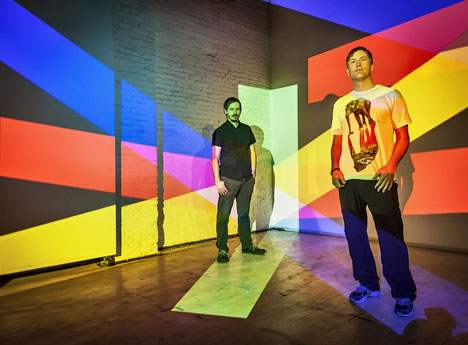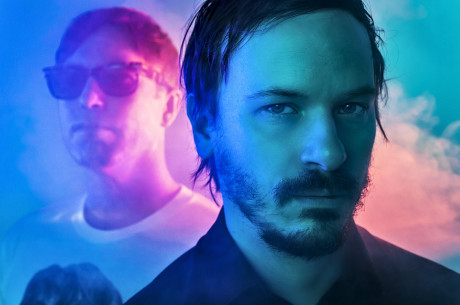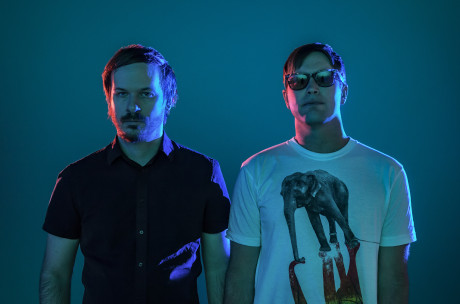
Talking to Iris
Posted In Interviews,Slider by Johan Carlsson
Iris has been one of the best synthpop bands to come out of the US, and they’ve stayed on top for 15 years. After a 4 year hiatus following the last album ”Blacklight” they’re now back together and have recently released ”Radiant”, a worthy follow-up. We got in contact with Reagan Jones and Andrew Sega.
The current US synthpop scene
The two Iris members live far apart on almost opposite ends of USA, as Andrew lives in New York and Reagan lives in Austin. I wondered what the current scene is like in the US, and Andrew starts off talking about his NYC.
- There are tons of hip electronic bands here in New York (St. Lucia, HAERTS, School of Seven Bells etc) but they don’t really form a “scene”, in my opinion. The only real electronic “scene” here is the EDM/techno scene, where you can see tens of thousands of people going to festivals like Electric Zoo. In terms of EU “synthpop” (Mesh, De/Vision, Covenant, et al), there are fans here but it’s still very co-mingled with the goth scene, which unfortunately is really more focused on fashion and lifestyle than music, which can actually hurt the bands to some extent as they get pigeonholed into a very niche subculture.
Reagan claims there are not many ”generation 2” synthpop bands left, but that there is a new generation coming up now.
- This newer, third generation is farming out some serious talent. It’s only getting better and faster. Now you have kids who weren’t exposed to the same discriminations older synthpop bands endured in the US, so they don’t think in terms of what’s cool or “allowed” because there are no rules for them. Their hearts are free and their creative minds are free, so the soil is far more fertile. Plus the ability to get right in and start producing is so much easier now, so kids can start at a very young age. Those are unprecedented advantages. Expect an explosion of amazing talent, the first wave of which has already begun.
Iris on the new album
I gather that ”Radiant” is partly about seeing things in a new light? Can you elaborate a little on this?
- Most of our work echoes that idea so ”Radiant” isn’t far different, but I think we approached it differently, Reagan explains. There was no urgency or immediate stress in the writing and recording, so that was rejuvenating. Whether by coincidence or a subliminal result of some new-found enjoyment in the creative process, the album took on a vibe that reflected the mood. It probably sounds more relaxed, more enjoyed, more creative. There was no plan, we just put a seed in the ground, not knowing what would sprout from it, and we’re genuinely grateful to see people responding the way they have. That’s maybe the most rejuvenating thing of all.
Can you tell us about some of your favourite tracks off “Radiant”? What they’re about, how they were done etc?
- I guess ”Wayseer”, ”Don’t Cry”, ”Rewired”, ”Sight Unseen”, and ”Life in a Forest” are my favorites, all for different reasons but they standout to me, Reagan starts off. I think each track on ”Radiant” has something unique to offer so I don’t want to dissect it too much, but people have favorites for various reasons and I guess those are mine. Explaining songs can take away from their value, plus it looks a bit self-absorbed, but since you asked I’ll give you a surface level summary. ”Wayseer” is the idea you can have a larger vision for life than the short sightedness we all get trapped by. ”Don’t Cry” says all sadness has a shelf life. ”Rewired” is my lifelong commitment to animal welfare. ”Sight Unseen” is kinda like “I Still Haven’t Found What I’m Looking for” but can sense what it is, and ”Life in a Forest” is about seeking companionship within a solitary life. There’s a lot more there, so this is just a rush and a push.
Andrew Sega continues.
- ”Wayseer” was a bit of experiment for me – I tried a few different versions with drums, but they weren’t really clicking. So for some reason I muted all the drum tracks, and turned the vocoder harmonies way up, and suddenly it worked as this very ambient, meditative song. I also really like ”Cries of Insanity”, which was originally a B-side which we added to the album at the last minute. I tried to give it a bit of a “big room” vibe with a lot of space and swirling mix elements. I also got the record mastered this time in 100% analog just to add a little bit of “roundness” to it and give just a hint of vintage feel.
Reunited
Iris reunited for Electronic Winter fest in Gothenburg in 2013. Would you have reunited if you hadn’t got the invite?
- We already had ”Another Way” on Andrew’s SoundCloud so it was probably on our minds to keep working, Reagan says. Still, the Sweden show was really good for us, even though I had food poisoning and had to leave immediately afterward, but the show itself was the best we’ve felt on stage in a long while. Something was right that night, just being relaxed or something. I don’t know. It’s also always nice to be back in Sweden, and we enjoyed that trip quite a lot, so yeah it probably glued things together a bit more than had we not gone, definitely.
- It’s hard to say for sure, but it really helped, Andrew continues. Shows like that remind you of why you’re in a band, and seeing the response made us start thinking more seriously about doing another record.
I remember the wildly enthusiastic response you got at the Arvika Festival when you came over here for the first time. Can you talk a bit about your somewhat special connection to Sweden and Scandinavia?
- It was really an amazing time at Arvika, says Andrew. As an artist, you never are 100% sure of where you are popular. We had heard rumors that we had a sizable fanbase in Scandinavia, and when we got a festival invite we were cautiously optimistic. I remember when we were setting up and soundchecking there may have been 30 or 40 people there waiting, and I had already resigned myself to having a small show. But right before we went on, I peeked out of the curtain there were hundreds and hundreds of people lined up, and even as the first song started they were streaming over the hill. Right before I started the track for “Annie Would I Lie to You”, I joked to Matt Morris (former member, editors note) that something crazy was about to happen, and it did. I recorded a bit of it during the bridge, which you can see on the “Hydra” DVD.
Collaboration
Living so far apart usually means trouble in a band with so called ”conventional” instruments, but, how does Iris do it? Reagan explains.
- Electronic music is almost by design, better when people live apart. At least I’d like to believe that. Generally it’s comprised of loner types who work better holed up in their own studio, so to merge that in the end isn’t a hindrance. There’s certainly advantages to working together in the same town, but it’s not something we know so it becomes hard to sense the difference.
Is it true that you are each other’s opposites? Is this why you basically split up after “Blacklight”?
- Nah I don’t think we’re each other’s opposites really, says Reagan. There’s some truth to that… well maybe a lot of truth so what am I saying here. Yeah, okay, maybe we are.
Andrew expands a little.
- We overlap in certain ways, but in others we are completely different. We can argue about everything from music to politics to cocktails. In some sense this tension enhances the music, but it also can make it difficult to proceed at times. It’s certainly an integral part of the band at this point, as Iris is sort of the diagram of the overlap in our personalities.
Were you in contact during your hiatus?
- Yes we know each other outside the band and share various interests away from music, so there was never any time lapse when we weren’t speaking, Reagan explains.
Since the last 4 years have been a bit shaky for the band you have to wonder about the future. Reagan tells us that they’re taking it as it happens, and that they work better without a plan. That said, he has already written 8 or 10 songs that are worth looking at further. At this time they’re enthused by making this album, and that will usually compel them to make more music. Andrew says it succinctly:
- I think right now we’re just taking it one album at a time. Making long-term plans isn’t something we really do.
Do you keep in touch with co-founder Matt Morris today?
- Yes definitely, Matt’s like the gold standard of how to live life with your “ducks in a row”, says Reagan. I have to watch what he’s doing to keep tabs with how far off the mark I am. He’s been working on a few interesting tracks as well, I don’t think you’ve heard the last of him.
Profile
Can you tell us a bit about yourselves? Age, profession, interests…?
Andrew:
- Is this the part which destroys the mystique of the band? I’m almost 40, and in “real life” I’m an executive at a tech company in New York City.
Reagan:
- 41, cyclist, trail runner, spiritual theorist, believer, hopefullist, wannabe entrepreneur with an idea I’m pursing called InviteMe. I work from home, tend to my farm of 3 dogs and 2 cats, try to keep myself in check and on the right course, write music, repeat until death.
On Wikipedia it says that Reagan is “a practicing Christian and environmentalist”. Can you expand on this, and how it affects Iris?
- I have a dream to evangelize to the Christian church that they should take up animal welfare as a Godly cause. I don’t say this in pride but in honest sadness that I’m a rare breed. I would love to be one of billions! I wish it wasn’t even an issue, I’d rather be on a beach in the Caribbean and not worrying about things, but that’s what I do. I worry. I feel a lot of pain for certain things, and until I find someone better suited to change things who I can work for and get behind, I’ll take this as far as I can, Lord willing.
Label switch
Your old label “A Different Drum” has closed down. Any comments on that, Andrew?
- ADD was certainly successful for a long time, and I think Todd Durrant catered to a very strong niche of people that were hungry to hear bands like Iris, De/Vision, Echoing Green, and even Swedish bands like Michigan and Code 64. We drifted a bit away from the pure synth “pop” style that Todd was curating, which is why we left ADD to release on our own label for a while, but we never lost respect for him and what he was doing. The music industry has changed so much in the last 20 years, and it’s very hard to run a profitable label these days, so I’m not surprised that he eventually had to pack it in. The legacy will live on, even if the business didn’t.
- They were the first label that gave us a chance, Reagan chimes in. I don’t like to see any business close, but Todd has other dreams he’ll pursue and excel at, so it’s also a celebration of that.
How did you end up on the Dependent label in Germany, and what’s it like?
- Torben at Infacted has supported us for a long time, but we decided to try something a bit different with this release, Andrew explains. Stefan Herwig contacted us, and since he really liked “Blacklight”, he made us an offer to join the newly restructured Dependent, and even offered to fund our limited edition vinyl (which was a goal of mine). So far it’s been working out well. It’s critical for us to have a label in Europe, as otherwise there is no practical way of making physical merchandise available over there without massive import fees.
Finally, any solid future plans such as singles or a tour?
Andrew:
- So far the response from the new record has been very positive, and so we’re figuring out our next steps. I would expect to see a few EU shows in 2015, and I’ve also been starting to collect remixes in preparation for another release. Expect some news on this front soon.
Photos by: Dirk Eusterbrock



